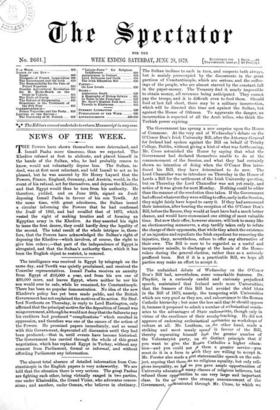NEWS OF THE WEEK.
11HPowers have shown themselves more determined, and IEsmail Pasha more timorous, than we expected. The Khedive refused at first to abdicate, and placed himself in the hands of the Sultan, who, he had probably reason to know, would not voluntarily depose him. The Sultan, in- deed, was at first most reluctant, and told Ismail to act as he pleased, but he was assured by Sir Henry Layard that the Powers, France, England, Germany, and Austria, would, in the event of his refusal, act for themselves, and depose the Khedive, and that Egypt would thus be torn from his authority. He therefore, yielded, and on June 26th, signed an Irade deposing Ismail Pasha in favour of his son Tewfik. At the same time, with great adroitness, the Sultan issued a circular informing the Powers that he had confirmed the Iradg of 1841, and had recalled that of 1873, which vested the right of making treaties and of forming an Egyptian army in the Khedive. As they asserted his right to issue the first decree, they could hardly deny the legality of the second. The total result of the whole intrigue is, there- fore, that the Powers have acknowledged the Sultan's right of deposing the Khedive—which involves, of course, the right to give him orders ;—that part of the independence of Egypt is abrogated, and that the Sultan's authority there, which it has been the English object to restrict, is restored.


































